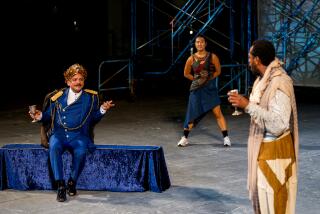Terrence McNally, whose newest is ‘And Away We Go,’ isn’t slowing
There are some writers who slow down with age. Terrence McNally, 72, is in many ways the opposite — a playwright who seems to grow more productive and adventurous as he gets older.
With four Tony Awards to his name, McNally could easily rest on his honors. But the writer clearly isn’t in the retirement mind-set. This week, McNally is at the Ojai Playwrights Conference to present his new play “AndAway We Go,” a time-hopping, meta-theatrical drama that he describes as one of his most experimental works.
Later this year, McNally will present the New York premiere of another new play, “Golden Age,” with Bebe Neuwirth, at the Manhattan Theatre Club. He is also working on a new musical with Lynn Ahrens and Stephen Flaherty — with whom he collaborated on “Ragtime” — as well as a new opera with composer Jake Heggie.
“I feel like I’m in the middle of my career — I don’t feel like I’m slowing down,” McNally said in a recent interview. “It doesn’t occur to me to stop.”
“AndAway We Go,” which will be performed Sunday at Ojai, travels across time to imagine the backstage drama that occurs during productions of Aeschylus’ “The Oresteia,” Chekhov’s “The Seagull,” Beckett’s “Waiting for Godot” and more. McNally said the play is intended to be a tribute to a kind of theater that is becoming increasingly marginalized — classical repertory with a resident company of actors.
“It’s a summation of what I’ve learned watching theater. It’s also stylistically very different than anything I’ve ever done,” he explained.
Six actors will play six roles each, mirroring the tradition of classical repertory in which performers take on several roles in rotation. The play was commissioned by New York’s Pearl Theatre, a classical company that will present the piece next season.
“The play touches on the compassion of art but also the problems and practicalities of it, and how something creative emerges from that,” said J.R. Sullivan, the artistic director of the Pearl.
McNally attributes his late-period productivity in part to his early training as a journalist. The playwright studied at Columbia University and intended to become a newspaper reporter. He worked briefly as a journalist in his hometown of Corpus Christi, Texas, before being seduced by the stage.
“I like deadlines,” he said. “I need deadlines. I’m not a compulsive writer — I don’t write everyday. I’ve learned not to go to the computer until I know what I want to write.”
Unlike some of his contemporaries, McNally hasn’t developed a signature writing style or set of thematic obsessions. His plays are remarkably diverse, from the working-class romance “Frankie and Johnny in the Clair de Lune,” to his controversial gay take on the Gospel “Corpus Christi,” to “Master Class,”his highly honored drama about a session for aspiring opera singer taught by Maria Callas.
“I don’t think I have a style. I have an aesthetic. I believe in a simplicity and fluidity of emotion — from tears to laughter,” he said.
And unlike many of his peers, McNally has largely steered clear of Hollywood. “I never really flirted with Los Angeles,” he said. “I dream in plays and L.A. is a town that dreams in movies. I never felt West Coast deprived.” McNally has lived in New York’s Greenwich Village for more than 50 years. He married his partner, Tom Kirdahy, in 2010.
While some writers avoid talking about their professional failures, McNally doesn’t seem fazed when asked to pick a play of his that didn’t work. He cited “Unusual Acts of Devotion,” which was presented at Ojai in 2008, as a piece that didn’t live up to his expectations. The play, about neighbors in a New York apartment building, later ran at the Philadelphia Theatre Co., and then in a shortened version at the La Jolla Playhouse.
“I was persuaded to cut too much, frankly. I lost control of my play,” he said. “I can’t blame anyone but me. I thought I was making the play better and I didn’t.”
But of course, McNally has moved on. His new opera with Heggie is about a famous singer who returns to her hometown, while the new Ahrens-Flaherty musical is based on the 1997 animated movie “Anastasia,” based on the idea that one of Czar Nicholas II’s daughters survived the massacre of the monarch and his family in 1918. Both pieces are currently in the writing phases.
“I do not think of them as playwrighting lite,” he said about his work on big-budget musicals, including “The Full Monty” and “Catch Me If You Can.” “It is a very demanding art form.”
McNally will also continue revising “And Away We Go.” The writer described the play as tonally serious, but with its share of humorous moments.
“It’s not a young man’s play — it’s not autumnal, exactly, but high summer.”
More to Read
The biggest entertainment stories
Get our big stories about Hollywood, film, television, music, arts, culture and more right in your inbox as soon as they publish.
You may occasionally receive promotional content from the Los Angeles Times.











